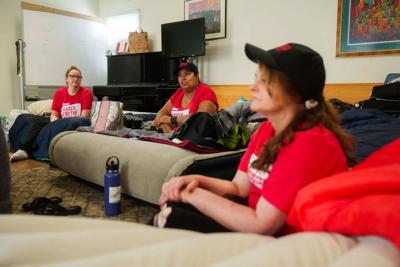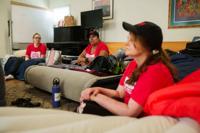
Aida Valdivia, a psychiatric social worker with Kaiser Permanente, sits on a blow-up air mattress that is set up in a room at West Hollywood United Church of Christ in West Hollywood on April 10, 2025. Kaiser's mental health workers have been on strike for six months, and the group in this room is on the fourth day of a five-day hunger strike. (Photo by Jules Hotz for CalMatters)
Nearly six months into their labor union dispute against Southern California Kaiser Permanente, eight mental health care workers banded together last week in an organized five-day hunger strike to highlight their cause.
“Kaiser’s trying to starve us out, that’s clear — so, give them what they want,” said Adriana Webb, a member of the National Union of Healthcare Workers who chose to subsist solely on water and electrolytes from Monday morning through Friday evening. “I feel hungry for equity. I feel hungry for change. How is this any different?”
Now engaged in the longest mental health strike in U.S. history, the Southern California workers have been seeking a new union contract that would include:
- more mandated time between therapy sessions for patient follow up
- restoration of pension benefits that were removed from new employee contracts in 2015
- cost-of-living wage adjustments
After a long list of Democratic members of the state Assembly and Senate wrote Kaiser in December urging it to accept the union’s “reasonable contract proposals” — and after Gov. Gavin Newsom’s Feb. 6 written request for both sides “to prioritize the common good that have allowed Californians to rise above our difficulties and resolve our differences” — state Health and Human Services Secretary Mark Ghaly and former Sacramento Mayor Darrell Steinberg have agreed to mediate.
Kaiser executives threw their hands up and walked out of mediation talks on March 11 when the union continued pressing its three major contract issues. Today bargaining talks are scheduled to resume.
Steinberg mediated a similar open-ended strike for Northern California Kaiser mental health care workers in 2022, which lasted 10 weeks and resulted in Kaiser meeting most of the union’s demands.
“We know Kaiser can provide all these things if they wanted to,” said Webb, a medical social worker in the infectious disease unit who stood on the picket line in front of Kaiser’s Los Angeles Medical Center on Sunset Boulevard. “They already provide it to our Northern California counterparts, and all we’re asking for is the same thing. Kaiser still can’t explain why we deserve less or our patients deserve less.”
In a written response to CalMatters questions, Kaiser Permanente spokesperson Terry Kanakri discussed Kaiser’s overall commitment to work with more than 40 unions that represent 80% of its employees.
“Every one of the 80 contracts is different, and each reflects the differences in operational needs, local market economics and wages, professional classifications of the employees in each local, and a host of other factors,” said Kanakri.
“Our goal is and has always been to reach an agreement that makes Kaiser Permanente the best place to give and receive care. We have made — and repeatedly improved — our proposals during bargaining in an effort to reach an agreement. However, in nearly nine months of bargaining, NUHW has made very little movement on the key bargaining issues.”
Although not aware of any specific details of the 2022 NorCal strike or the current SoCal strikes, University of Southern California professor of healthcare finances and economics Glenn Melnick gave his overview on today’s health care labor climate.
“Northern California has the highest wage index in the country,” he said. “I think it’s 20 points higher than L.A. — maybe 25%. So there’s economic reasons why there’s differences. An economist would say, ‘Mental health care worker, you want these benefits? Move to San Francisco.’
“And many employers are cutting back pension benefits these days. Ten or 15 years ago, pension benefits were much more generous across the board. Kaiser could easily afford to give them these benefits and not think twice, but it’s bigger than just these workers. It’s the ripple effect, right?”
Melnick also speculated that health care workers’ negotiating power has waned as the COVID pandemic, which drove demand for their services, has somewhat subsided.
From April 8 through 12, the hunger strikers spent eight-hour days alongside their picketing fellow union members and each night together fasting at a West Hollywood church. Sleeping in a community space barely big enough for eight air mattresses huddled beside the piano against a back wall, they shared a bathroom and took turns showering in a motel room next door.
Medically cleared beforehand, they received daily wellness checks from volunteer union nurses.
“Right now, I feel like I could go another month,” said Zhane Sandoval, propped up on an elbow from their mattress on the morning of April 11, day four of the hunger strike. “So test me, Kaiser!
“Kaiser says that it’s a union employer, but all we’re seeing is union busting. All we’re seeing is separation, trying to divide. But their efforts just lead us to unite.”
Union organizer Rachel Forgash, who stayed overnight with the hunger strikers at the church, expressed frustration over the protracted standoff.
“Kaiser has exceeded all of our expectations in their unwillingness to bargain in good faith and drag this out as long as possible,” she said. “In Southern California, they’re about to start bargaining with the Alliance, which is a huge group of unions at Kaiser, and I think they’re afraid that — when we win — it’s going to set a precedent for other unions to fight just as hard.”
Aida Valvidia, a psychiatric social worker at Kaiser’s Sylmar facility, and Melissa Chavez, a medical social worker at Riverside, both started working for Kaiser before the 2015 contract negotiations reached a settlement, so they each have pension benefits that 70% of their fellow mental health care union members do not. Yet both chose to participate in the hunger strike.
“For the people who don’t have pensions, I think it’s unfair,” said Valvidia. “Why do I have a pension and you don’t? Because you started later? That makes no sense to me. We’re equals.”
Chavez and her husband have been on strike together since Oct. 21. “Kaiser members deserve equity and access to timely quality care,” she said. “Workers are experiencing high caseloads, inadequate and unsafe staffing, lack of time, lack of tools.”
The hunger strike week started with iconic labor leader and activist Dolores Huerta visiting the picketers on April 8, two days before her 95th birthday. “I know that you’re not just doing this on your own behalf,” said Huerta, surrounded by cheering union members in their red union T-shirts. “You’re actually doing this on behalf of all the patients at Kaiser that are not getting the mental health services that they deserve.”
The union cites a recent 88-page report from the state Department of Managed Health Care, which notes that Kaiser’s failures to remedy 19 of the 20 violations in 2022 led to $200 million in state fines. The union has also filed its own complaints alleging Kaiser mismanages patient triage and appointment scheduling, by hiring unlicensed clerical staff and using algorithmic programming.
“Despite the persistent efforts of NUHW to mislead the public, the Department of Managed Health Care (DMHC) has not identified new deficiencies in our mental health care,” said Kanakri’s statement. It went on to say that Kaiser met with the state department “last week in our first quarterly review and demonstrated the extraordinary progress we have made on all the deficiencies outlined in the Corrective Action Work Plan.”
“We’re in disbelief,” said hunger striker Nick Nunez, a therapist in Kaiser’s Virtual Medical Center, which lends support to any patients in need across Southern California. “They take out ads in the paper saying everything’s fine — that they’re providing adequate care to their patients and everything is top-notch. It’s so bizarre and unbelievable.”
Andrew Kane worked as an associate clinical social worker at the Los Angeles Medical Center he now pickets and fasted at. “It’s a little odd, a little surreal,” he said, noting that he happened to see a patient in the world outside of Kaiser. “Fortunately — or unfortunately — he didn’t notice me, so we didn’t have to have that interaction.”
Kane started in June 2024, so he’s been on strike longer than he’s received a Kaiser salary.
As the strike persisted without end in sight since October, many workers have returned to Kaiser due to financial concerns. But some communicate the problems they see internally while back at work.
“They’re actually the ones documenting all the things going wrong,” said hunger striker Kassaundra Gutierrez-Thompson, a psychiatric social worker in Kaiser’s ADAPT virtual online treatment program. “We have DMHC investigators talking to a lot of our returned back staff. Unfortunately, a lot of our managers are combatting them.
“And so, a lot of our members are kind of scared, having to advocate for our patients.They’re fighting a different kind of battle inside.”
Rage Against the Machine guitarist and political labor activist Tom Morello joined the Kaiser picketers on April 9 to perform a short acoustic set, and U.S. Rep. Sydney Kamlager-Dove and state Sen. Maria Elena Durazo visited the strikers April 11.
Hours later, they broke their fast with religious leaders passing around a ceremonial bread loaf.
“We can’t just be treated like numbers,” said hunger striker Ana Vargas Garcia, who also saw members remotely through the ADAPT program. “Patients can’t be treated like numbers. There’s real lives behind everyone that we see, behind every worker at Kaiser. That’s a big part of why we’re doing this.”











(0) comments
Welcome to the discussion.
Log In
Keep it Clean. Please avoid obscene, vulgar, lewd, racist or sexually-oriented language.
PLEASE TURN OFF YOUR CAPS LOCK.
Don't Threaten. Threats of harming another person will not be tolerated.
Be Truthful. Don't knowingly lie about anyone or anything.
Be Nice. No racism, sexism or any sort of -ism that is degrading to another person.
Be Proactive. Use the 'Report' link on each comment to let us know of abusive posts.
Share with Us. We'd love to hear eyewitness accounts, the history behind an article.